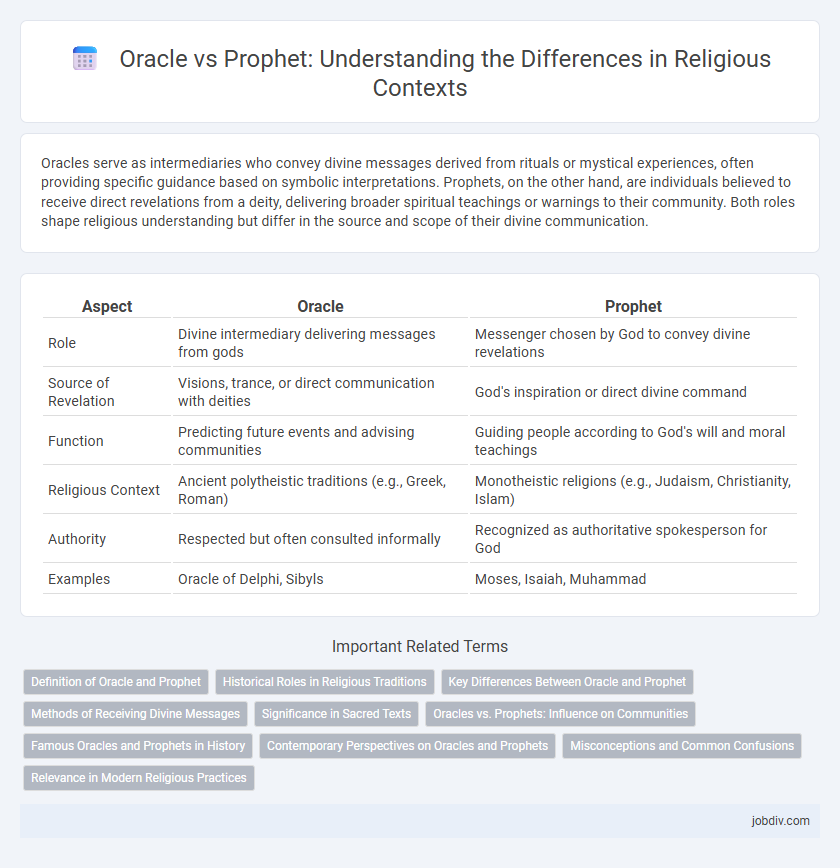Oracles serve as intermediaries who convey divine messages derived from rituals or mystical experiences, often providing specific guidance based on symbolic interpretations. Prophets, on the other hand, are individuals believed to receive direct revelations from a deity, delivering broader spiritual teachings or warnings to their community. Both roles shape religious understanding but differ in the source and scope of their divine communication.
Table of Comparison
| Aspect | Oracle | Prophet |
|---|---|---|
| Role | Divine intermediary delivering messages from gods | Messenger chosen by God to convey divine revelations |
| Source of Revelation | Visions, trance, or direct communication with deities | God's inspiration or direct divine command |
| Function | Predicting future events and advising communities | Guiding people according to God's will and moral teachings |
| Religious Context | Ancient polytheistic traditions (e.g., Greek, Roman) | Monotheistic religions (e.g., Judaism, Christianity, Islam) |
| Authority | Respected but often consulted informally | Recognized as authoritative spokesperson for God |
| Examples | Oracle of Delphi, Sibyls | Moses, Isaiah, Muhammad |
Definition of Oracle and Prophet
An oracle is a medium through whom divine messages or revelations are communicated, often providing cryptic or symbolic guidance from gods or supernatural forces. A prophet is an individual inspired by a deity to deliver clear, direct messages or predictions, frequently calling for moral or spiritual reform. While oracles primarily serve as channels for divine will, prophets actively interpret and convey divine teachings to influence their communities.
Historical Roles in Religious Traditions
Oracles historically served as intermediaries delivering divine messages primarily through specific sacred sites or rituals in ancient religions, often embodying a fixed spiritual authority. Prophets appeared across various monotheistic traditions, conveying direct, personal revelations from God with a focus on moral guidance and future predictions, adapting their messages to social contexts. Both roles significantly influenced religious narratives by shaping ethical codes and community beliefs, yet prophets typically engaged more actively in reform and social justice issues.
Key Differences Between Oracle and Prophet
Oracles are traditionally understood as intermediaries who deliver divine messages or revelations through rituals, often involving mystical objects or natural phenomena, typically tied to specific locations or sacred sites. Prophets are individuals believed to receive direct, personal communication from a deity, conveying God's will, guidance, or future events to the community with a moral and ethical emphasis. The key difference lies in the mode and source of revelation: oracles often relay messages through symbolic or indirect means, while prophets articulate direct verbal messages intended for teaching, correction, or prophecy.
Methods of Receiving Divine Messages
Oracles receive divine messages through rituals, trance states, or interpreting signs, often acting as intermediaries between the divine and humans in specific sacred sites. Prophets receive revelations directly from a deity, typically through visions, dreams, or audible communication, emphasizing verbal proclamations and moral guidance. While oracles rely on ceremonial practices, prophets prioritize personal spiritual experience and explicit divine instruction.
Significance in Sacred Texts
Oracles in sacred texts often serve as divine intermediaries, delivering cryptic messages or visions from gods, as seen in the ancient Greek tradition and the Book of Daniel. Prophets, prominently featured in the Bible and the Quran, are depicted as chosen individuals who receive direct revelations from God to guide, warn, or instruct communities. The significance of prophets in religious scripture underscores their role in shaping moral laws and spiritual destiny, contrasting with oracles whose pronouncements are typically more enigmatic and situational.
Oracles vs. Prophets: Influence on Communities
Oracles often functioned as intermediaries delivering divine messages through ritualistic practices, shaping communal decisions and reinforcing societal norms in ancient cultures. Prophets, by contrast, conveyed direct divine revelations that challenged existing structures, inspiring social reform and moral accountability within communities. The influence of oracles generally emphasized conformity and tradition, while prophets tended to promote transformation and ethical awakening.
Famous Oracles and Prophets in History
Famous oracles such as the Oracle of Delphi in ancient Greece provided divine guidance through cryptic messages believed to be inspired by the god Apollo. Prominent prophets like Moses and Isaiah in Judeo-Christian traditions conveyed direct revelations from God, often delivering moral laws and future predictions. Both oracles and prophets played critical roles in shaping religious beliefs and societal decisions across history.
Contemporary Perspectives on Oracles and Prophets
Contemporary perspectives on oracles emphasize their role as intermediaries who provide divine insights through ritualistic and symbolic means, often operating within specific cultural frameworks. In contrast, prophets are viewed as individuals who deliver direct, often outspoken messages from a divine source, shaping moral and social agendas across communities. Modern religious studies highlight the evolving functions of both oracles and prophets in adapting ancient spiritual traditions to present-day ethical and existential concerns.
Misconceptions and Common Confusions
Oracles and prophets are often confused due to their shared role as intermediaries between the divine and humans, yet oracles typically deliver messages through rituals or signs, whereas prophets provide direct communication often accompanied by moral or future guidance. Misconceptions arise from the interchangeable use of the terms in popular culture, ignoring the distinct historical and theological contexts each holds across various religions. Understanding these differences clarifies that prophets convey authoritative divine revelations, while oracles interpret divine will more ambiguously through symbolic means.
Relevance in Modern Religious Practices
Oracles, traditionally seen as intermediaries who convey divine messages through cryptic signs, contrast with prophets, who receive direct revelation and provide explicit guidance rooted in ethical and spiritual teachings. In modern religious practices, prophets remain central figures whose teachings shape community values and moral conduct, while oracular practices have become more symbolic or ceremonial, reflecting a decline in literal reliance. The enduring influence of prophets emphasizes personal faith and doctrinal adherence, making their role more relevant in contemporary worship and spiritual leadership.
Oracle vs Prophet Infographic

 jobdiv.com
jobdiv.com